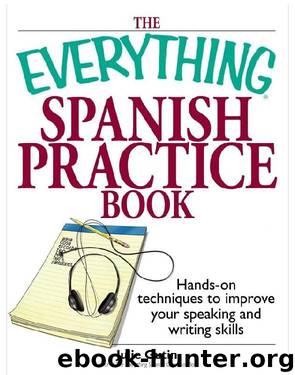The Everything Spanish Practice Book: Hands-On Techniques to Improve Your Speaking and Writing Skills by Julie Gutin

Author:Julie Gutin
Language: eng
Format: epub
Tags: ebook, book
Publisher: Adams Media
Published: 2011-07-13T00:00:00+00:00
TRACK 25
Listen to each statement of what someone has to do and then rewrite using the ir a form to explain what the person is going to do. For example: Tienes que limpiar la casa. Vas a limpiar la casa.
Just Finished
Another useful verbal expression to know is acabar de + infinitive. Acabar is “to finish,” but the expression can be used to refer to an action that was just completed. Here is an example:
Acabo de leer este libro.
I just finished reading this book.
The expression acabar de + infinitive need not to be in the present tense:
Acabé de escuchar esta canción.
I had just finished listening to this song.
Exercise 10: Blast front the Recent Past
Rewrite each sentence to make it refer to an action that just happened, using acabar de.
1. Usted lee la revista.
.......................................................................................................................................
2. Yo veo la imagen.
.......................................................................................................................................
3. Vosotros fingís alegría.
.......................................................................................................................................
4. La tienda cierra.
.......................................................................................................................................
5. El señor muere.
.......................................................................................................................................
Exercise 11: What Did You Just Do?
Given each situation, complete the sentence with what you just did.
1. La casa está muy limpia. Acabo de .
2. No puedes comer más. Acabo de .
3. El público aplaude con entusiasmo. Acabo de .
4. Tu cabello está peinado. Acabo de .
5. Eres muy alegre. Acabo de .
Saber Versus Conocer
Non-native Spanish speakers often have trouble deciding whether to use saber or conocer. Both translate as “to know”; saber can also mean “to be able to do,” and conocer sometimes means “to meet.” In some situations, the distinction isn't very clear. Here's a quick review.
Saber is used to express knowledge or ignorance of a fact, and when talking about knowing or not knowing how to do something:
¿Sabes nadar?
Do you know how to swim?
Yo sé la respuesta.
I know the answer.
Ella sabe cuál es la capital de Francia.
She knows what's the capital of France.
Conocer is used to express an acquaintance with a person, place, or thing. María conoce a José means “Maria knows José” in the sense that she's met him, not merely that she knows of him.
Él no conoce a ninguno de sus vecinos.
He doesn't know any one of his neighbors.
Conozco San Francisco—pasé muchos años viviendo allá.
I know San Francisco—I spent many years living there.
Exercise 12: What You Know, You Know
Download
This site does not store any files on its server. We only index and link to content provided by other sites. Please contact the content providers to delete copyright contents if any and email us, we'll remove relevant links or contents immediately.
Portuguese For Dummies by Karen Keller(1214)
English Verbs by Collins(904)
1001 Pitfalls in Spanish by Marion P. Holt;Julianne Dueber(878)
Botchan (Penguin Translated Texts) by Soseki Natsume(828)
English Made Easy Volume Two by Jonathan Crichton & Pieter Koster(779)
Siddhartha (Penguin Classics Deluxe Edition) by Hermann Hesse(777)
Rick Steves Germany 2017 by Rick Steves(761)
Hungarian by Hungarian(750)
Italian Phrases For Dummies by Francesca Romana Onofri & Karen Antje Möller(736)
Wheelock's Latin by Frederic M. Wheelock & Richard A. Lafleur(723)
English Made Easy Volume 2 by Jonathan Crichton & Pieter Koster(706)
Tales from the Thousand and One Nights (Classics) by(682)
Siddhartha: An Indian Tale (Penguin Twentieth-Century Classics) by Hermann Hesse(660)
Collins Greek Phrasebook and Dictionary Gem Edition by Collins Dictionaries(656)
Rick Steves' Germany 2011 by Rick Steves(645)
Practice Makes Perfect: Complete Italian Grammar (Practice Makes Perfect Series) by Danesi Marcel(636)
Korean Slang: As Much as a Rat's Tail: Learn Korean Language and Culture through Slang, Invective and Euphemism by Peter Liptak & Siwoo Lee(602)
Personal Memoirs of Ulysses S. Grant (AmazonClassics Edition) by Grant Ulysses S(592)
Siddhartha (Modern Library Classics) by Hermann Hesse(564)
